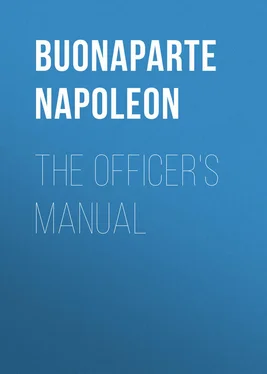Buonaparte Napoleon - The Officer's Manual
Здесь есть возможность читать онлайн «Buonaparte Napoleon - The Officer's Manual» — ознакомительный отрывок электронной книги совершенно бесплатно, а после прочтения отрывка купить полную версию. В некоторых случаях можно слушать аудио, скачать через торрент в формате fb2 и присутствует краткое содержание. Издательство: Иностранный паблик, Жанр: foreign_antique, foreign_prose, Биографии и Мемуары, на английском языке. Описание произведения, (предисловие) а так же отзывы посетителей доступны на портале библиотеки ЛибКат.
- Название:The Officer's Manual
- Автор:
- Издательство:Иностранный паблик
- Жанр:
- Год:неизвестен
- ISBN:нет данных
- Рейтинг книги:5 / 5. Голосов: 1
-
Избранное:Добавить в избранное
- Отзывы:
-
Ваша оценка:
- 100
- 1
- 2
- 3
- 4
- 5
The Officer's Manual: краткое содержание, описание и аннотация
Предлагаем к чтению аннотацию, описание, краткое содержание или предисловие (зависит от того, что написал сам автор книги «The Officer's Manual»). Если вы не нашли необходимую информацию о книге — напишите в комментариях, мы постараемся отыскать её.
The Officer's Manual — читать онлайн ознакомительный отрывок
Ниже представлен текст книги, разбитый по страницам. Система сохранения места последней прочитанной страницы, позволяет с удобством читать онлайн бесплатно книгу «The Officer's Manual», без необходимости каждый раз заново искать на чём Вы остановились. Поставьте закладку, и сможете в любой момент перейти на страницу, на которой закончили чтение.
Интервал:
Закладка:
These general principles in the art of war were entirely unknown, or lost sight of, in the middle ages. The crusaders in their incursions into Palestine appear to have had no object but to fight and to conquer, so little pains did they take to profit by their victories. Hence, innumerable armies perished in Syria, without any other advantage than that derived from the momentary success obtained by superior numbers.
It was by the neglect of these principles, also, that Charles XII, abandoning his line of operation and all communication with Sweden, threw himself into the Ukraine, and lost the greater part of his army by the fatigue of a winter campaign in a barren country destitute of resources.
Defeated at Pultawa, he was obliged to seek refuge in Turkey, after crossing the Nieper with the remains of his army, diminished to little more than one thousand men.
Gustavus Adolphus was the first who brought back the art of war to its true principles. His operations in Germany were bold, rapid, and well executed. He made success at all times conducive to future security, and established his line of operation so as to prevent the possibility of any interruption in his communications with Sweden. His campaigns form a new era in the art of war.
MAXIM IV
When the conquest of a country is undertaken by two or three armies, which have each their separate line of operation, until they arrive at a point fixed upon for their concentration, it should be laid down as a principle, that the union of these different corps should never take place near the enemy; because the enemy, in uniting his forces, may not only prevent this junction, but may beat the armies in detail.
In the campaign of 1757, Frederick, marching to the conquest of Bohemia with two armies, which had each their separate line of operation, succeeded, notwithstanding, in uniting them in sight of the Duke of Lorraine, who covered Prague with the imperial army; but his example should not be followed. The success of this march depended entirely on the inaction of the duke, who, at the head of seventy thousand men, did nothing to prevent the junction of the two Prussian armies.
MAXIM V
All wars should be governed by certain principles, for every war should have a definite object, and be conducted according to the rules of art. (A war should only be undertaken with forces proportioned to the obstacles to be overcome.)
It was a saying of Marshal Villars, that when war is decided on, it is necessary to have exact information of the number of troops the enemy can bring into the field, since it is impossible to lay down any solid plan of offensive or defensive operation without an accurate knowledge of what you have to expect and fear. “When the first shot is fired,” observes Marshal Villars, “no one can calculate what will be the issue of the war. It is, therefore, of vast importance to reflect maturely before we begin it.” When once, however, this is decided, the marshal observes that the boldest and most extended plans are generally the wisest and the most successful. “When we are determined upon war,” he adds, “we should carry it on vigorously and without trifling.”
MAXIM VI
At the commencement of a campaign, to advance or not to advance , is a matter for grave consideration; but when once the offensive has been assumed, it must be sustained to the last extremity. However skilful the manœuvres in a retreat, it will always weaken the morale of an army, because, in losing the chances of success, these last are transferred to the enemy. Besides, retreats always cost more men and materiel than the most bloody engagements; with this difference, that in a battle the enemy’s loss is nearly equal to your own – whereas in a retreat the loss is on your side only.
Marshal Saxe remarks, that no retreats are so favorable as those which are made before a languid and unenterprising enemy, for when he pursues with vigor, the retreat soon degenerates into a rout. “Upon this principle it is a great error,” says the marshal, “to adhere to the proverb which recommends us to build a bridge of gold for a retreating enemy. No; follow him up with spirit, and he is destroyed!”
MAXIM VII
An army should be ready every day, every night, and at all times of the day and night, to oppose all the resistance of which it is capable. With this view, the soldier should always be furnished completely with arms and ammunition; the infantry should never be without its artillery, its cavalry, and its generals; and the different divisions of the army should be constantly in a state to support, to be supported, and to protect itself.
The troops, whether halted, or encamped, or on the march, should be always in favorable positions, possessing the essentials required for a field of battle; for example, the flanks should be well covered, and all the artillery so placed as to have free range, and to play with the greatest advantage. When an army is in column of march, it should have advanced guards and flanking parties, to examine well the country in front, to the right, and to the left, and always at such distance as to enable the main body to deploy into position.
The following maxims, taken from the memoirs of Montécuculli, appear to me well suited to this place, and calculated to form a useful commentary on the general principles laid down in the preceding maxim:
1. When war has been once decided on, the moment is past for doubts and scruples. On the contrary, we are bound to hope that all the evil which may ensue, will not; that Providence, or our own wisdom, may avert it; or that the want of talent on the part of the enemy may prevent him from benefiting by it. The first security for success is to confer the command on one individual. When the authority is divided, the opinions of the commanders often vary, and the operations are deprived of that ensemble which is the first essential to victory. Besides, when an enterprise is common to many, and not confined to a single person, it is conducted without vigor, and less interest is attached to the result.
After having strictly conformed to all the rules of war, and satisfied ourselves that nothing has been omitted to ensure eventual success, we must then leave the issue in the hands of Providence, and repose ourselves tranquilly in the decision of a higher power.
Let what will arrive, it is the part of a general-in-chief to remain firm and constant in his purposes; he must not allow himself to be elated by prosperity, nor to be depressed by adversity: for in war good and bad and fortune succeed each other by turns, form the ebb and flow of military operations.
2. When your own army is strong and inured to service, and that of the enemy is weak and consists of new levies, or of troops enervated by long inaction, then you should exert every means to bring him to battle.
If, on the other hand, your adversary has the advantage in troops, a decisive combat is to be avoided, and you must be content to impede his progress, by encamping advantageously, and fortifying favorable passes. When armies are nearly equal in force, it is desirable not to avoid a battle, but only to attempt to fight one to advantage. For this purpose, care should be taken to encamp always in front of the enemy; to move when he moves, and occupy the heights and advantageous grounds that lie upon his line of march; to seize upon all the buildings and roads adjoining to his camp, and post yourself advantageously in the places by which he must pass. It is always something gained to make him lose time, to thwart his designs, or to retard their progress and execution. If, however, an army is altogether inferior to that of the enemy, and there is no possibility of manœuvring against him with success, then the campaign must be abandoned, and the troops must retire into the fortresses.
Читать дальшеИнтервал:
Закладка:
Похожие книги на «The Officer's Manual»
Представляем Вашему вниманию похожие книги на «The Officer's Manual» списком для выбора. Мы отобрали схожую по названию и смыслу литературу в надежде предоставить читателям больше вариантов отыскать новые, интересные, ещё непрочитанные произведения.
Обсуждение, отзывы о книге «The Officer's Manual» и просто собственные мнения читателей. Оставьте ваши комментарии, напишите, что Вы думаете о произведении, его смысле или главных героях. Укажите что конкретно понравилось, а что нет, и почему Вы так считаете.












